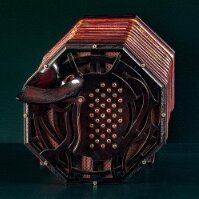Search the Community
Showing results for tags 'reed'.
-
Today I finally had my set of testing reeds delivered from Harmonikas.cz and I have made some simple test recording. It is available here: https://soundcloud.com/martynowi-cz/reed-tests The reeds tested are: 1.DIX reed on an alluminum plate; 2.DIX reed on a brass plate 3.DIX reed on a zinc plate 4.Tipo A Mano alluminum reed 5.Export Durall alluminum reed 6. Old russian alluminum reed salvaged from a cheap russian CBA (it was the only valved reed in this test) Some important notes: all DIX reeds were identical in size, standard accordion reeds were larger but both in the same size. Old russian reed is a bit smaller than Tipo A Mano and Export durall reeds and has old leather valves (one of which has obviously blocked a lot of airflow). From what can be heard "live": alluminum reeds were louder and brighter. When played "in mouth" brass and zinc reeds had significantly more honky sound, a bit like trumpet or other reedles brass instruments. DIX reeds have somewhat distorted, slightly more buzzing sound than standard reeds. From the three, the alluminum one was the brightest and most susceptible to pressure variations and more volume modulation can be obtained than in brass and zinc ones. Those were more stable and subtle, with zinc one having fewest of the higher harmonics in the falloff stage (but only slightly less than brass one and both had significantly less than alluminum one). As a testing setup I have used my DIY bellows and beech, single block reedpan. There is no additional reflections dampening, the setup was completely open (no endplates, no valves, no hole pads or action).
-
Wondering if anyone has a good suggestion for an air pump for tuning and playing with reeds? I saw an earlier discussion that more-or-less concluded that an old bellows was the way to go. Probably OK for tuning, but I also want to do some experiments with reeds, and a constant-flow, hands-and-feet-free system would be preferable. Ideally quiet so as not to interfere unduly with measurements and recordings. Desirable to have suck and blow available. Don't want to spend a fortune though. Any bright ideas? Good to know too what people have tried and how well they have gone. Nice to know what traps one might fall into! Terry
-
Hi My Rochelle took a tumble and 4 reeds have come unstuck and fallen out of their berths. What kind of glue should I be using for putting them back in? It seems that originally (brown) animal glue was used. Can i dare think of using a standard synthetic wood glue like vinavil ? It's a question of sticking metal to wood. thanks if anyone can help all the best Dominic R. Umbria, Italy


